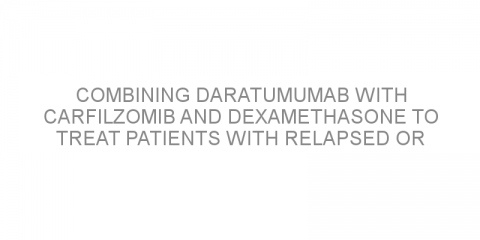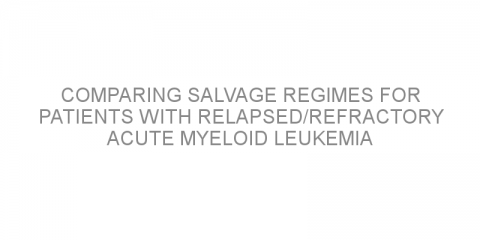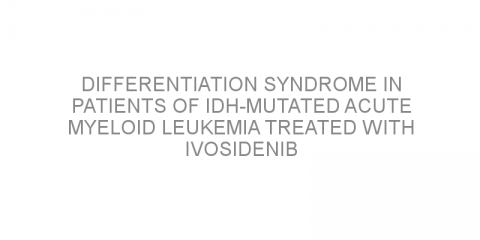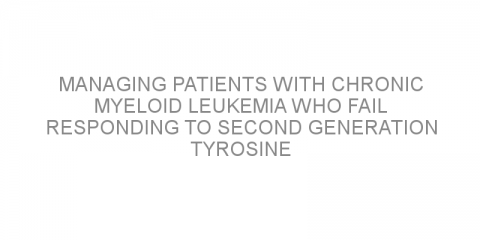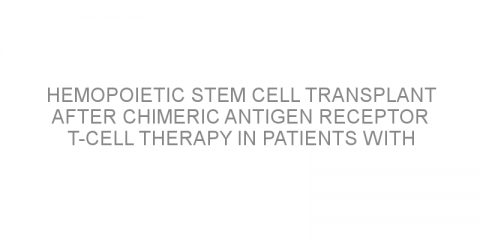In a nutshell The study evaluated outcomes of the combination of carfilzomib (Kyprolis; K), dexamethasone (Decadron; d), and daratumumab (Darzalex; D) in patients with relapsed or refractory (r/r) multiple myeloma (MM). The authors found that KdD was safe and effective to improve progression-free survival (PFS) in such patients compared to...
Read MoreCurrent treatment status-Not currently treated Posts on Medivizor
MTX-HOPE chemotherapy for patients over 70 with relapsed non-Hodgkin’s lymphoma
In a nutshell This study looked at MTX-HOPE (methotrexate, hydrocortisone, vincristine, sobuzoxane, etoposide) to treat patients over 70 with non-Hodgkin’s lymphoma (NHL) which had returned after previous treatments. It found that MTX-HOPE was an effective and safe treatment for these patients. Some background NHL is a group of cancers of the...
Read MoreComparing salvage regimes for patients with relapsed/refractory acute myeloid leukemia
In a nutshell This study aimed to compare two salvage regimes for patients with relapsed/refractory acute myeloid leukemia. This study concluded that both regimens have similar effectiveness in terms of overall response but one shows a significant reduction in side effects in these patients. Some background...
Read MoreDifferentiation syndrome in patients of IDH-mutated acute myeloid leukemia treated with ivosidenib and enasidenib
In a nutshell The study evaluated the occurrence of differentiation syndrome (DS) in patients with IDH-mutated acute myeloid leukemia (AML) under ivosidenib (Tibsovo) and enasidenib (Idhifa) therapy. The authors found that DS is a common and adverse condition in such patients. Some background Mutations or changes in the isocitrate dehydrogenase (IDH)...
Read MoreManaging patients with chronic myeloid leukemia who fail responding to second generation tyrosine kinase inhibitors
In a nutshell The report recommends how to manage patients with chronic-phase chronic myeloid leukemia (CP-CML) who failed to respond to 2nd generation tyrosine kinase inhibitors (TKIs). The authors suggested to consider patient-specific factors and personalize treatment for such patients. Some background TKIs deactivate cancerous enzymes which cause...
Read MoreWhich low-intensity chemotherapy is most effective for patients with classical Hodgkin lymphoma receiving stem cell transplantation?
In a nutshell This study compared the effectiveness of three low-intensity chemotherapy combinations to treat patients with classical Hodgkin lymphoma (HL) following stem cell transplantation (SCT). There were no significant differences between the three chemotherapy types in terms of patients’ survival and relapse. Some background...
Read MoreHave the outcomes of stem cell transplants for young patients with relapsed or refractory Hodgkin lymphoma improved over time?
In a nutshell This study examined if the outcomes of stem cell transplants (SCT) have improved for young patients with relapsed or refractory Hodgkin lymphoma (HL) over time. The results showed that SCT has improved the survival rate and reduced the relapse rate of HL in young patients in recent years. Some background While initial treatment is...
Read MoreHemopoietic stem cell transplant after chimeric antigen receptor T-cell therapy in patients with relapsed/refractory B-cell acute lymphoblastic leukemia
In a nutshell This study aimed to investigate if a hemopoietic stem cell transplant should be carried out after chimeric antigen receptor T cell therapy in patients with B-cell acute lymphoblastic leukemia. This study concluded that this treatment path led to high event-free survival in these patients. Some background...
Read MoreHow effective is BV-DHAP chemotherapy to treat patients with relapsed or refractory Hodgkin lymphoma?
In a nutshell This study examined the effectiveness and safety of the chemotherapy combination BV-DHAP for patients with relapsed or refractory Hodgkin lymphoma (HL). The authors found that BV-DHAP was an effective and safe treatment to progress patients to high-dose chemotherapy and stem cell transplant. Some background During treatment, some...
Read MoreEvaluating lurbinectedin for unresponsive small cell lung cancer
In a nutshell This study evaluated the safety and effectiveness of an experimental treatment, lurbinectedin, in patients with small-cell lung cancer (SCLC) after unsuccessful treatment with platinum-based chemotherapy. The authors found that this treatment showed promising effectiveness and manageable side effects in these...
Read MoreEvaluating brentuximab vedotin for elderly patients with hard to treat Hodgkin lymphoma
In a nutshell This study evaluated the safety and effectiveness of brentuximab vedotin (Adcetris) in elderly patients with relapsed or unresponsive Hodgkin lymphoma (HL). This study found that this treatment was effective, although frail patients may be at higher risk for side effects. Some background Most patients with HL respond to front-line...
Read MoreEvaluating brentuximab vedotin plus bendamustine for patients with hard-to-treat classical Hodgkin lymphoma
In a nutshell This study evaluated the effectiveness of brentuximab vedotin (Adcetris) plus bendamustine (Treanda) for patients with hard to treat classical Hodgkin lymphoma (cHL). This study found that this regimen is an effective salvage therapy for these patients. Some background Standard first-line chemotherapy is highly effective in treating...
Read More
